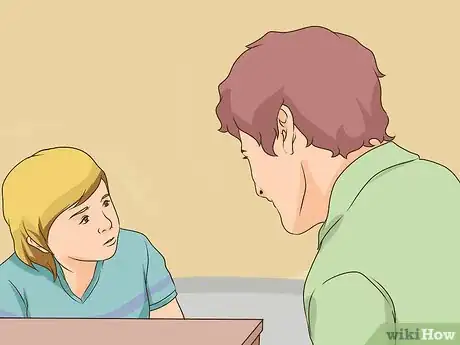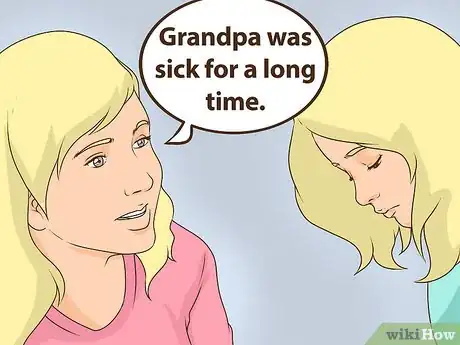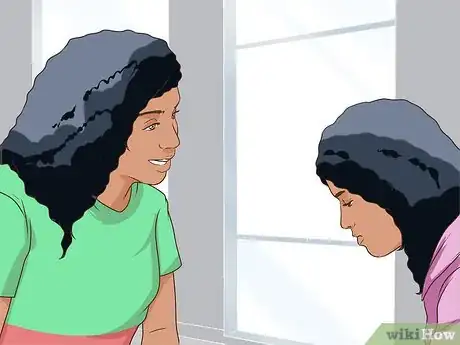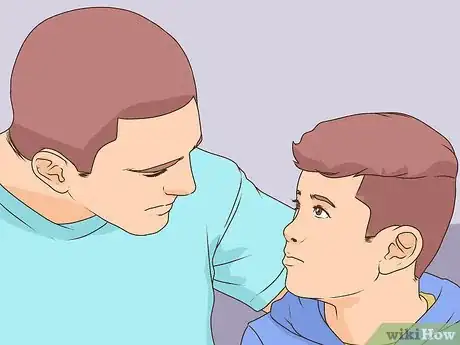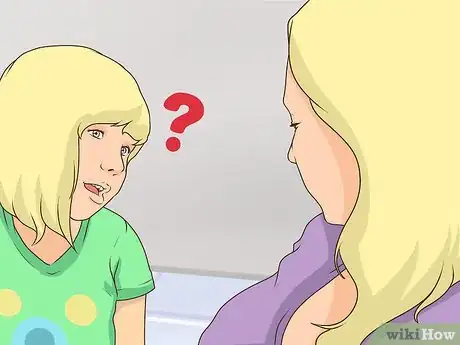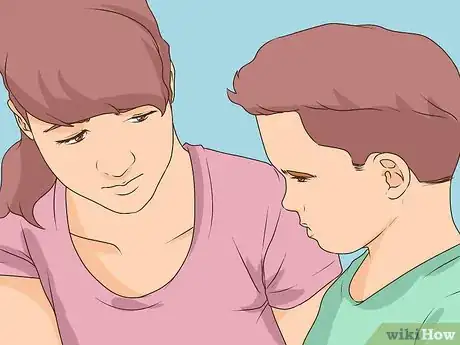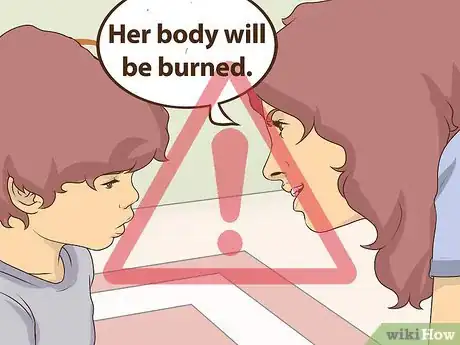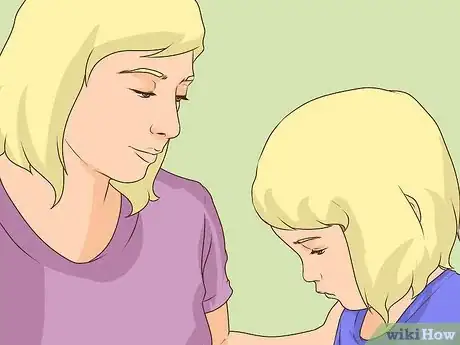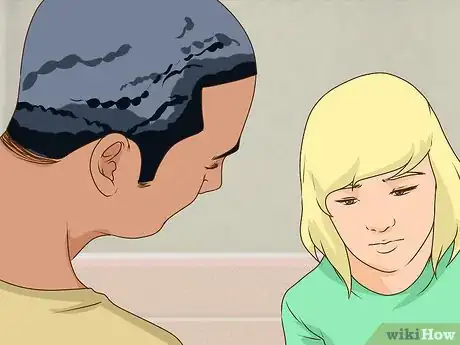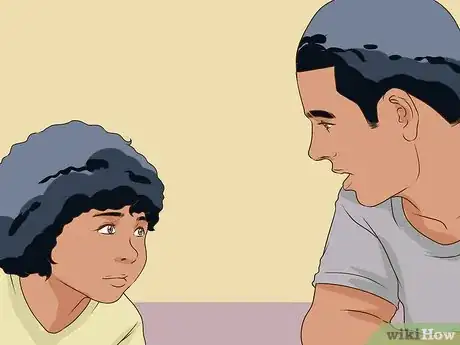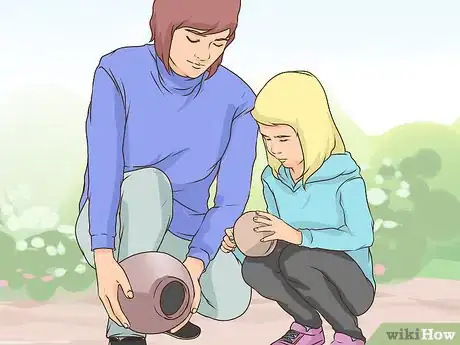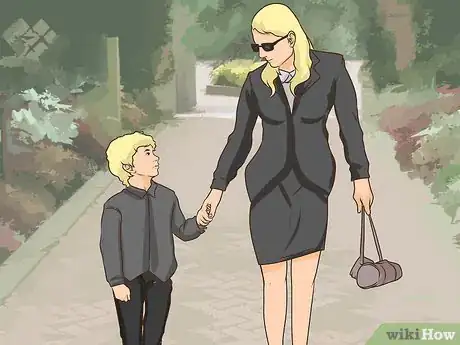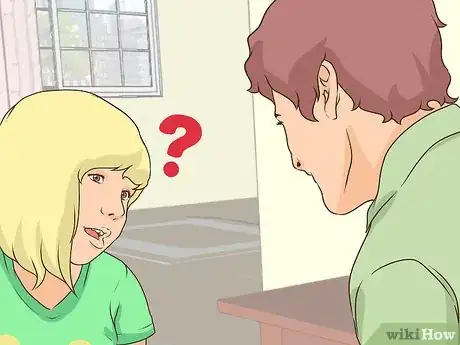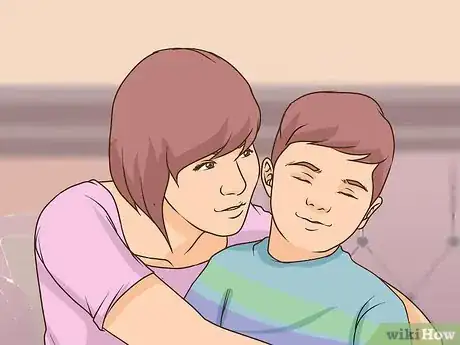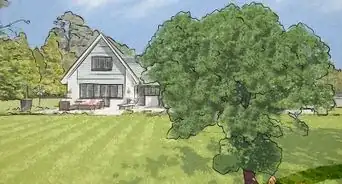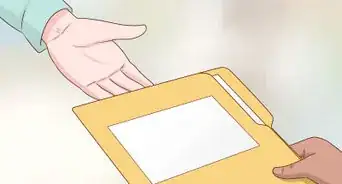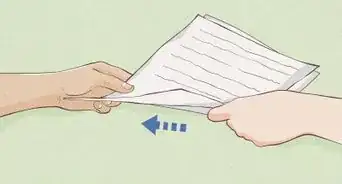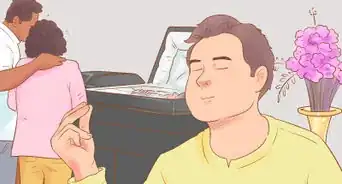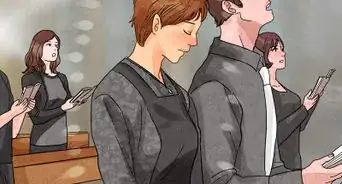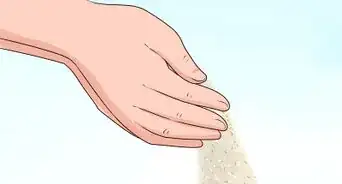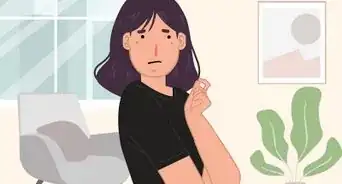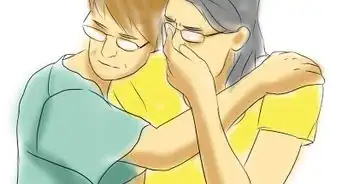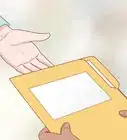This article was co-authored by Jade Giffin, MA, LCAT, ATR-BC. Jade Giffin is an Art Psychotherapist based in New York, New York. She brings over a decade of experience specializing in the treatment of trauma and grief, pre and post-partum and parenting challenges, anxiety and stress management, self-care, and social, emotional, and learning difficulties for adults, teenagers, and children. Jade holds a BA in Psychology and Visual Arts from Barnard College and an MA in Art Therapy from New York University with distinction. She is a Hughes Fellow and Lehman Award recipient for providing outstanding clinical work. Jade's roles also encompass clinical supervisor, therapeutic program developer, published researcher, and presenter.
wikiHow marks an article as reader-approved once it receives enough positive feedback. In this case, 86% of readers who voted found the article helpful, earning it our reader-approved status.
This article has been viewed 59,312 times.
Explaining to a child what happens to a body after death can be challenging. Talking to a child about cremation poses a unique set of challenges, but these can be overcome with a thoughtful approach. Being honest and sincere in your explanations of death, following the child’s lead, and involving the child in the memorialization process can help you better explain cremation to a child.
Steps
Talking About Death to a Child
-
1Consider the child’s age and developmental stage. A child’s age and developmental stage affects their understanding of death. Preschool age children might think death can be reversed. Children ages 5-9 realize death is final, but think they can escape it. By age 10 children begin understanding death as an irreversible part of life that will eventually happen to them.
-
2Be honest and sincere. It is important to provide simple and relevant explanations of death to children. For example, if Grandfather passed away after a prolonged illness try saying, “Grandpa was sick for a long time. His body just quit working and the doctors couldn’t fix it.”
- Don't try to hide your emotions about what happened. If you feel sad or angry, it's okay to show that. If you don't, it can make it harder for your child to process their own emotions.[3]
- If there was an untimely death, such as your family friend died in an accident, try to word things in a safe way that won't further traumatize your child unnecessarily. For instance, you might say, "Kim was in a bad car accident that caused her body to stop working and the doctors and nurses couldn’t fix it.” Omit descriptive details that you don't need to say. Use words such as "bad". It gets across that there was something wrong, but it won't scare them.
Advertisement -
3Avoid using euphemisms that might be confusing. Do not use explanations like, “Daddy went to sleep,” as the child could develop a fear of sleeping. Likewise you shouldn’t say, “Mommy went away.” This can instill fear of even brief separations like a parent going to the store or the child going to school.
-
4Make sure the child understands what has been said. It’s critical that you ensure the child has understood what you explained to them about death. This may take time and it may require the answering of the same questions repeatedly. Be patient with the child.
- After providing an explanation, follow your child's lead. They may need time to quietly process this information or they may want to ask many more follow-up questions.
- A way to ensure your child understands is to ask them to explain what they think happens when someone dies. Try asking, “Joey, what happened to Aunt Kristen when she died?”
- Many kids learn by repetition, so they might need to have their questions answered repeatedly.
- Some children might not show much of a reaction at first—they might even seem like they weren't listening. That can be part of how they're processing it, so give them time to absorb it on their own pace. Just make sure they know you're there when they're ready to talk.[4]
-
5Allow the child to ask questions and answer them honestly. It’s normal for children to have questions about death, and it’s important you are open and forthcoming when responding to these inquiries even if you don’t have all the answers.
- If a child asks, “Will I die, too?” try saying, “All living things die eventually, but most of us will live until we are very old so you don’t need to worry about dying for a long time.”
- If your child asks, “Will you die, too, Mommy?” respond by saying, “I plan to live for a really really long time. I will love you all the time. You will always be loved and cared for.”
- If you aren't sure how to answer a question, it's okay to say things like, "I'm not sure..." "I wonder..." or "Let me think about that and get back to you." Then, ask a trusted resource, like a partner or a friend, or seek professional support, such as a book or therapist, for guidance.
-
6Read books about death with your child. There are many child-focused books on the subject of death that you could read with your child.[5] Reading a developmentally-appropriate book about death with your child may help them to gain a better understanding of it.
Talking about Cremation to a Child
-
1Follow the child’s lead. Each child is unique and not all children will be curious about the process of cremation. Answer the child’s questions and make sure you don’t push the child’s curiosity by explaining what they seem uninterested in.
- Consider what prompted your child to ask about cremation to help guide the conversation. For example, did they over hear that a loved one was going to be cremated instead of buried and wonder what that meant? Or did they hear it from a friend or while watching TV? Use the situation as a way to tailor your discussion of cremation.
-
2Don’t use words like burn or fire. Using such words can have a negative impact on the child. Telling a child that their grandmother will be burned or placed in a fire can cause fear. It’s important that the child is not scared by the concept of cremation.[6]
- Don’t say, “Grandma wanted to be cremated. This means her body will be burned.”
- Instead try saying, “Grandma wanted to be cremated when she died. This means that her body will be placed in a very hot room until her body turns into soft ashes.”
-
3Reassure the child that the deceased will not feel any pain. Cremation can sound scary to children, and many are afraid that the deceased will experience extreme pain as their remains are burned. You can avoid this by reassuring them pain is not part of the process.[7]
- Try saying, “Anna, I want you to know that Daddy will not be hurt when he is cremated.”
-
4Tell the child the deceased’s spirit will not be harmed during cremation. If you are spiritual or religious, explain the soul will not be harmed. For families who believe in the concept of a soul, it’s important the child knows the deceased’s spirit or soul will not be affected by the process of cremation.[8]
- Try saying, “Grandma’s body will be turned into soft ashes, but her spirit will not be harmed because it left her body when she passed on.”
-
5Provide child-friendly details about cremation if the child asks for more information. Do not go into detail unless the child asks you for specifics. Some children will be extremely curious about precisely how the process of cremation works. If the child wants details, try conveying some of the following information to them.[9]
- Try saying, “There won’t be any smoke or smell when Mommy is cremated. It will just get very hot – about three times as hot as our oven gets – and this heat will turn everything into soft ashes except some pieces of bone.”
- You can also say, “After cremation what’s left of Uncle Tom’s body will look similar to kitty litter. However the remains will be white because they are made of bone.”
-
6Explain what will happen to the ashes after cremation. Letting a child know where their loved one’s ashes will end up after cremation can help them find peace and closure. Discuss the deceased’s wishes with the child, whether it be the scattering of ashes or their memorialization in an urn.
- Try saying, “Aunt Ashley really loved the farm where we grew up in Kentucky. She wanted her ashes to be scattered there after her death, which is why we are traveling there next week.”
- If the deceased’s ashes will be memorialized in an urn, say to the child, “Daddy wanted to be close to us always and asked that his ashes be placed in a special container called an urn. To honor him we will keep the urn with his ashes on the mantle.”
Supporting the Child in the Post-Cremation Process
-
1Include the child in the memorialization process. Allowing the child to make a decision about whether or not they will participate in the funeral, memorial, or scattering of ashes will allow them to approach their loved one’s death in a way that feels comfortable to them.[10]
- You say to the child, “Bobby, we are going to have a ceremony to honor Uncle Ted. Is there anything special you’d like to do to say goodbye to him?”
- Remember, don't force your child to attend any memorial. Forcing them may cause more issues and could possibly affect the grieving process negatively
-
2Allow the child to continue asking questions. Just because a child did not seem interested in talking about death or cremation in the immediate days and weeks following the passing of a loved one doesn’t mean they won’t have questions in the future.
- Try saying, “Amanda, I know it’s been a few months since we scattered Grandpa’s ashes. Do you have any questions I can help you answer?"
-
3Make sure you support the child in the weeks, months, and years following cremation. It is critical that children feel supported and loved throughout the grieving process. Creating a space for your child to mourn openly and remaining available as time passes will help the child heal.[11]
- Tell the child you are there to support them in any way they need. Try saying, “Georgie, I’m feeling sad about Grandma’s passing and maybe you are, too. I just want you to know I am here to listen to and support you.”
- Try visiting the place where you scattered the deceased’s ashes with the child. Allow the child to talk openly about their feelings, but don’t push them.
-
4Note any changes in the child’s behavior. After the cremation process is complete and the loved one has been memorialized, watch your child closely for changes in their mood or behavior. These types of changes may indicate that the child is having a hard time processing the death. Seek the help of a mental health professional if you notice any changes in your child’s mood or behavior.
Expert Q&A
Did you know you can get expert answers for this article?
Unlock expert answers by supporting wikiHow
-
QuestionHow do I keep from getting upset when I talk to my child about death and cremation?
 Jade Giffin, MA, LCAT, ATR-BCJade Giffin is an Art Psychotherapist based in New York, New York. She brings over a decade of experience specializing in the treatment of trauma and grief, pre and post-partum and parenting challenges, anxiety and stress management, self-care, and social, emotional, and learning difficulties for adults, teenagers, and children. Jade holds a BA in Psychology and Visual Arts from Barnard College and an MA in Art Therapy from New York University with distinction. She is a Hughes Fellow and Lehman Award recipient for providing outstanding clinical work. Jade's roles also encompass clinical supervisor, therapeutic program developer, published researcher, and presenter.
Jade Giffin, MA, LCAT, ATR-BCJade Giffin is an Art Psychotherapist based in New York, New York. She brings over a decade of experience specializing in the treatment of trauma and grief, pre and post-partum and parenting challenges, anxiety and stress management, self-care, and social, emotional, and learning difficulties for adults, teenagers, and children. Jade holds a BA in Psychology and Visual Arts from Barnard College and an MA in Art Therapy from New York University with distinction. She is a Hughes Fellow and Lehman Award recipient for providing outstanding clinical work. Jade's roles also encompass clinical supervisor, therapeutic program developer, published researcher, and presenter.
Art Psychotherapist It's really important to show genuine emotion when you're talking about someone dying. It's absolutely okay to show a wide range of feeling, including sadness and anger. Sometimes parents want to shield their children from these things, but that can actually perpetuate more fear, uncertainty, and shame about their own emotions.
It's really important to show genuine emotion when you're talking about someone dying. It's absolutely okay to show a wide range of feeling, including sadness and anger. Sometimes parents want to shield their children from these things, but that can actually perpetuate more fear, uncertainty, and shame about their own emotions. -
QuestionAm I going to get cremated?
 Community AnswerYou will only be cremated if you have arranged before your death that you want to be cremated, or if your guardian decides he/she wants you to be cremated after you have died.
Community AnswerYou will only be cremated if you have arranged before your death that you want to be cremated, or if your guardian decides he/she wants you to be cremated after you have died. -
QuestionHow old does a person have to be to be cremated?
 Community AnswerThere is no age requirement for being cremated.
Community AnswerThere is no age requirement for being cremated.
References
- ↑ Jade Giffin, MA, LCAT, ATR-BC. Art Psychotherapist. Expert Interview. 30 October 2020.
- ↑ Jade Giffin, MA, LCAT, ATR-BC. Art Psychotherapist. Expert Interview. 30 October 2020.
- ↑ Jade Giffin, MA, LCAT, ATR-BC. Art Psychotherapist. Expert Interview. 30 October 2020.
- ↑ Jade Giffin, MA, LCAT, ATR-BC. Art Psychotherapist. Expert Interview. 30 October 2020.
- ↑ https://whatsyourgrief.com/childrens-books-about-death/
- ↑ http://www.familyeducation.com/life/death-and-dying/explaining-cremation-kids
- ↑ http://www.cremationresource.org/cremation/how-to-explain-cremation-to-a-child.html
- ↑ http://www.familyeducation.com/life/death-and-dying/explaining-cremation-kids
- ↑ http://griefwords.com/index.cgi?action=page&page=articles%2Fhelping28.html&site_id=2
